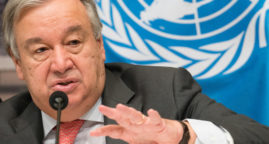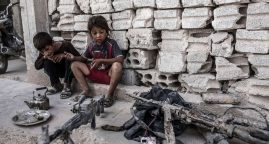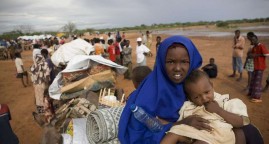UN refugee chief says protecting Mosul civilians is key
Speaking in Baghdad, UN High Commissioner for Refugees Filippo Grandi stresses civilian protection must be part of the military strategy for retaking Iraq’s second city.
UN High Commissioner for Refugees Filippo Grandi said the protection of civilians is key to Iraq’s future and should be foremost in the government’s strategy as a large military offensive to retake Mosul got underway today.
“The protection of civilians is the most important element of this operation from our perspective,” Grandi told reporters a news conference in Baghdad.
Grandi was speaking just hours after the start of a ground and air operation to retake Iraq’s second largest city, which was home to nearly 2.5 million people before it was taken by militants in June 2014.
The High Commissioner, who is on a four-day visit to Iraq, stressed that he had received the strongest assurances from Iraqi Prime Minister Haider Al-Abadi and his government that civilian protection would be part of their military strategy to retake the city.
“The protection of civilians is the most important element of this operation from our perspective.”“I received assurances that it will be, because it will be indispensable for the future of Iraq, for a future in which the people of Iraq can live together and build a prosperous country,” Grandi said.
The assault on Mosul comes as the number of people displaced by war in Iraq has reached 3.3 million, or nearly one-tenth of the population.
In a worst-case scenario, the assault could result in more than one million civilians fleeing the city, with hundreds of thousands likely to need assistance with shelter and other basic services, humanitarian agencies have warned.
Grandi stressed that security screening of those fleeing the city should be conducted “in the most appropriate manner” – preferably overseen with UN monitors.
Sites for civilians uprooted by the assault should be provided away from the frontlines, to ensure that vulnerable groups, in particular women and children, “are protected to the extent possible,” he said.
To that end, UNHCR, the UN Refugee Agency, has five camps open and ready to shelter 45,000 people fleeing Mosul and surrounding areas. It plans to have a total of 11 camps open in the coming weeks, with a capacity for 120,000 people, provided land can be set aside in safe areas away from the frontlines.
UNHCR has five camps open and ready to shelter 45,000 people fleeing Mosul and surrounding areas.
Iraqi military operations have been ongoing in the Mosul corridor for several months. Since May, over 180,000 people have fled the area.
Anticipating increased displacement, UNHCR is to make available 50,000 emergency shelter kits to aid up to 300,000 people outside camps. The kits include items such as plastic sheeting and construction tools to make shelters.
Additionally, 25,000 tents will be made available to shelter up to 150,000 people. The UN Refugee Agency also aims to provide 30,000 so-called “sealing off kits,” to weatherproof sub-standard shelters and buildings for a further 180,000 people.
UNHCR’s Mosul response budget of US$196.2 million is currently just over 38 per cent funded. Grandi said that the funds are needed not just for initial preparation, but for displacement that could last through the winter.
“It is likely that people who move out will not stay for a short period, but may stay for several weeks or months, and this is during the winter season, so we need to give them appropriate assistance,” Grandi said, noting that obtaining the money is therefore “urgent.”
Read the article on the UNHCR website
Download the UNHCR RESPONSE PLAN/ MOSUL SITUATION
Related Articles
Most ‘precious’ and ‘scarce’ resource of our time is dialogue, UN chief tells Doha policy forum
António Guterres, speaking in Doha, underscored the importance of international cooperation in the “enormous challenges” of our time.
UN Security Council urges more protections for children in conflicts
10/31/2017. Mr. Guterres said children around the world are suffering “enormously and unacceptably,” resulting in “global shame.
October 2015: crucial week in Geneva
10/12/2015. Peter Maurer, president of the International Committee of the Red Cross, expressed concern about the politicization of humanitarian aid which paralyzes assistance efforts.






